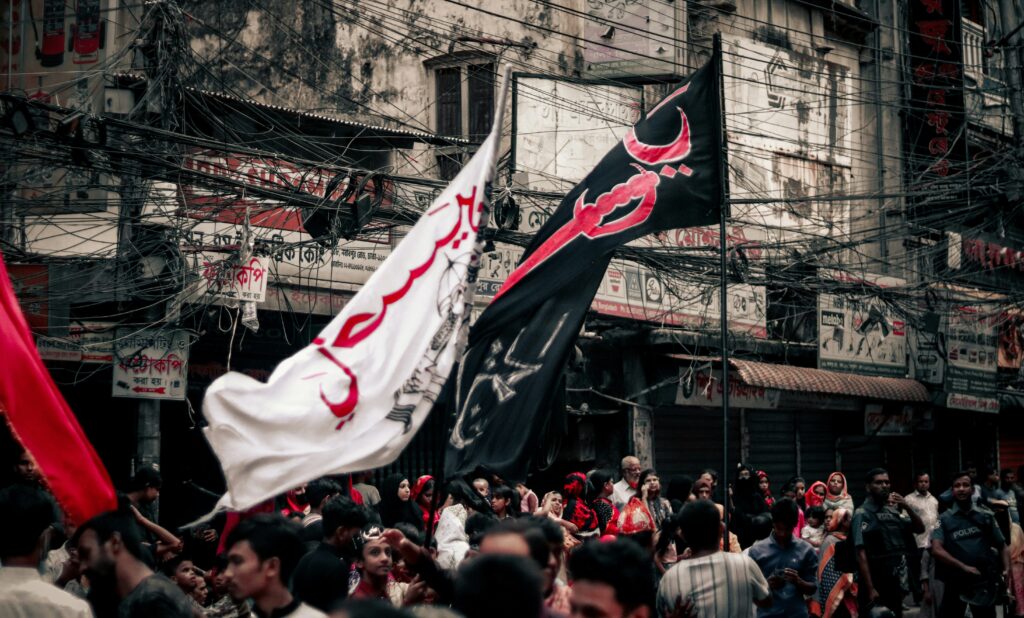M Adam Ahmad, Al Hakam

Fasting on the 10th of Muharram, widely known as the day of Ashura, had a place in early Islamic history – even before the martyrdom of Hazrat Imam Husainra. The tradition of fasting on this day has its roots in prophetic practices and biblical accounts.
Ashura and the practice of Prophet Muhammadsa
Fasting on Ashura in the month of Muharram precedes the tragedy of Karbala. The Holy Prophetsa observed this fast before the commandment of fasting in Ramadan was revealed. It was a long-standing custom among the Arabs, and the Holy Prophetsa upheld it both in Mecca and Medina.
According to Hazrat Sahibzada Mirza Bashir Ahmadra, before Ramadan fasting became obligatory, voluntary fasting – including on Ashura – was practised by the Holy Prophetsa and his Companionsra:
“Prior to the ordinance of fasting in the month of Ramadan, the Holy Prophetsa would observe voluntary fasting as well. However, until then, this had not been formally and specifically instituted for a specific time period. As such, it is narrated in the ahadith that prior to the obligation of fasting in the month of Ramadan, the Holy Prophetsa would fast on the day of Ashurah, i.e., on the 10th of Maharram and would encourage the Companionsra to do the same.” (The Life and Character of the Seal of Prophetssa, Vol. 2, p. 113)
In one narration, it is reported that Hazrat Abu Hurairahra relates:
The Holy Prophetsa once passed by a group of Jews who were observing a fast on the day of Ashura. The Holy Prophetsa inquired, “What is the significance of this fast?” They replied, “It was on this very day that Allah saved Mosesas and the Israelites from drowning, and Pharaoh was destroyed. On this day as well, Noah’sas Ark came to rest upon Mount Judi. Both Mosesas and Noahas observed a fast on this day as an expression of gratitude to Allah.” Upon hearing this, the Holy Prophetsa said, “I am more entitled to Mosesas than they are.” He then observed the fast himself and also instructed his Companionsra to fast on the day of Ashura. (Musnad Ahmad ibn Hanbal [Beirut], Vol. 2, pp. 359-360; Friday Sermon, 1 April 2005)
Ashura and fasting in the Bible
After highlighting that no previous religion prescribed fasting with the same discipline and comprehensive guidance as found in Islam, Hazrat Mirza Tahir Ahmad, Khalifatul Masih IVrh said:
“Fasting is also mentioned in the Bible. For instance, the 10th of Muharram is said to be the day on which the Israelites were delivered from the tyranny of Pharaoh. According to the teachings of Prophet Mosesas, this day was to be remembered and observed through fasting.” (Leviticus 16:29-34; Khutbat-e-Tahir, Vol. 2, p. 317)
On another occasion, Hazrat Mirza Tahir Ahmadrh explained:
“In the early days after the migration to Medina, the Holy Prophetsa observed only the fast of Ashura. This is confirmed through multiple sources, including Sahih Bukhari. When the Holy Prophetsa learned that the Jews also fasted on this day, he inquired about the reason. He was told that, according to their tradition, this was the day when Mosesas was saved from Pharaoh’s oppression. In gratitude to God, the Jews would fast on this day. Upon hearing this, the Holy Prophetsa said, ‘Moses is closer to us than to the Jews.’ He then instructed a public announcement […] that those who had not eaten anything since dawn should observe the fast of Ashura, and those who had already eaten could compensate by fasting another day, just as one can make up missed fasts of Ramadan.” (Sahih al-Bukhari, Hadith 2001; Sahih Muslim, Hadith 1130a; Khutbat-e-Tahir, Vol. 7, p. 247-248)
Ashura in the Latter Days
Expounding on the connection between the Latter Days and the events surrounding Pharaoh – as reflected in the sayings of the Holy Prophetsa – Hazrat Mirza Tahir Ahmadrh explained:
“The idea that, in the Latter Days, the Ummah of Muhammadsa would have a significant connection to the events surrounding Pharaoh, was divinely disclosed to the Holy Prophetsa. The Holy Prophetsa elucidated this matter with clarity and emphasis.” (Khutbat-e-Tahir, Vol. 7, p. 653)
The Holy Prophetsa thus prophesied a repetition of events from Moses’ era in the Latter Days. According to Jami‘ at-Tirmidhi, Hazrat Khalifatul Masih IVrh states:
“A man asked Hazrat Alira to advise him regarding voluntary fasting beyond Ramadan. Hazrat Alira replied that only one man before had posed such a question, and he had done so in the presence of the Holy Prophetsa. In response, the Holy Prophetsa said: “If you desire to fast in any month apart from Ramadan, choose Muharram. It is the month of Allah. In it lies a day on which God turned in mercy to a people and accepted their repentance, granting them deliverance. Similarly, He will again, in the latter days, turn in mercy to another people, accepting their repentance and granting them deliverance from their own Pharaoh – and this too will occur in this very month.” (Ibid., p. 654; Jami‘ at-Tirmidhi, Hadith 741)
This prophecy was related to the advent and mission of Hazrat Mirza Ghulam Ahmadas, the Promised Messiah and Mahdi. He received multiple divine revelations pertaining to this matter:
- “A time will come upon you like the time of Moses.” (Tadhkirah [English], p. 637)
- “God, the Majestic and Glorious, has also told me that both these […] are Signs in support of my truth like the Signs which Mosesas demonstrated before Pharaoh and the Sign which Noahas showed to his people.” (Ibid., p. 701)
- “There is a Moses whom I shall make manifest and upon whom I shall bestow honour in the eyes of people.” (Ibid., p. 933)
Hazrat Mirza Tahir Ahmadrh states:
“This [above explanation] shows that the events involving Pharaoh and the injustices he inflicted upon Prophet Moses, peace be upon him, led to a divine decree from God Almighty – a decree so significant that it was destined to manifest once again [in the Latter Days].” (Khutbat-e-Tahir, Vol. 7, p. 655)
The practice of commemorating Ashura

As far as the practice of commemorating Ashura is concerned, Hazrat Khalifatul Masih IVrh expressed during a televised question-and-answer session held in London:
“The practice of commemorating Ashura is a new and un-Islamic tradition. There is no base or foundation for it either in the Holy Quran, nor in the Hadith, nor by the Holy Prophetsa nor by his Companionsra. Hazrat Ali’sra children themselves never commemorated Ashura. Upon whom all this passed, they themselves did not get to know how one must commemorate this. The Shias who came afterwards got to know somehow the real way of commemoration. And it is not just one tragedy; many tragedies have occurred. Prophet Jesusas passed through a very painful incident too, and far greater and harsher injustices occurred before this. In the era of the Holy Prophetsa, he himself was the target of severe oppression. To overlook him – through whom his progeny gained their eminence – and instead highlight only their suffering [is not appropriate]. Hazrat Hamzara and other many Companionsra of the Holy Prophetsa were martyred and dragged through the streets, all of this began in the time of the Holy Prophetsa […]. Where has Ashura been commemorated for them?” (How do Ahmadis celebrate Ashura?, www.youtube.com)
Cautioning against religious innovations, Hazrat Mirza Masroor Ahmad, Khalifatul Masih Vaa stated:
“History informs us that […] there are numerous days that came to be commemorated. There is the day of Ashura. Milad-un-Nabi [the celebration of the Holy Prophet’ssa birth] is, of course, widely recognised. Then there is Milad Hazrat Alira, Milad Hazrat Hassanra, Milad Hazrat Hussainra, and Milad Hazrat Fatimah al-Zahrara. The first night of the month of Rajab is commemorated, as is its mid-month night. Similarly, the first night of Sha‘ban is observed, and then there’s the night of khatm as well. Additionally, there are various events associated with the month of Ramadan. In fact, there is an overwhelming number of such observances – days that have introduced innovations into Islam.” (Friday Sermon, 13 March 2009)
Fasting and Muharram
Responding to a question about fasting during the first ten days of Muharram, the Promised Messiahas clarified that it is not obligatory. (Badr, 14 March 1907, p. 5)
Hazrat Mirza Tahir Ahmadra said:
“When the commandment to observe fasting during Ramadan was revealed, the Holy Prophetsa said that one is now free regarding the fast of Ashura [i.e., it is not compulsory] – those who desire may observe the fast, and those who do not may refrain. God has granted us our own prescribed fasts.” (Sahih al-Bukhari, Hadith 2001; Khutbat-e-Tahir, Vol. 7, p. 248)
Regarding his view that Ramadan, rather than Muharram, constitutes the defining measure of the Islamic year, Hazrat Khalifatul Masih IVrh stated:
“As I advised you clearly last year, you should also reflect on your journey from one Ramadan to the next. A year is often marked from one specific point to another, depending on the calendar being followed. For instance, the Gregorian year begins on 1 January and ends on 31 December.
“However, when it comes to the Islamic calendar, our year effectively begins with Ramadan – that is, in practice, we consciously begin our year with Ramadan. Although the Islamic calendar officially starts with Muharram, in my view, it is Ramadan that serves as the true benchmark of the year. It starts with Ramadan and comes full circle with the next Ramadan.” (Khutbat-e-Tahir, Vol. 14, p. 972)

